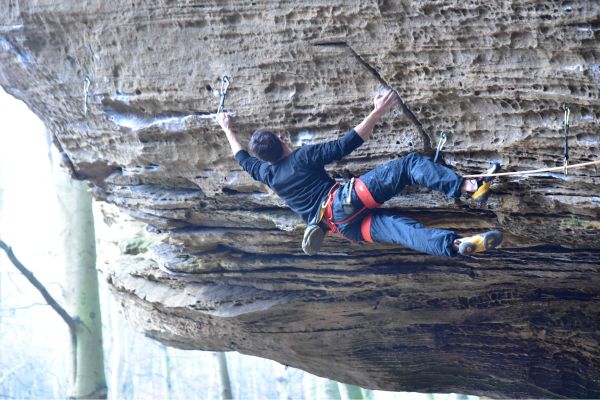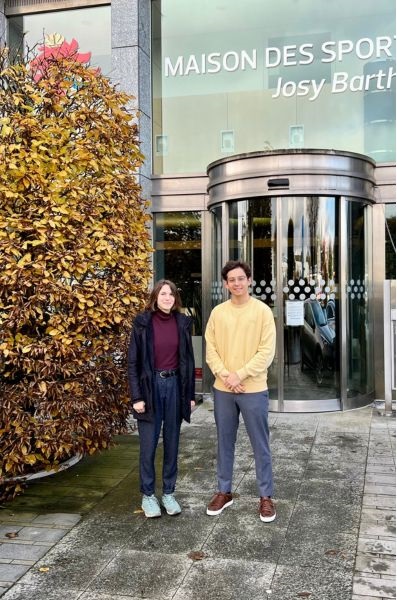 Yves climbs the borderline route in Berdorf;
Credit: Jacques Welter (FLERA President)
Yves climbs the borderline route in Berdorf;
Credit: Jacques Welter (FLERA President)
The Luxembourg Federation of Climbing, Hiking and Mountaineering (FLERA) was created in 2000 and is the governing body of all Luxembourgish Climbing Disciplines.
Fourteen Luxembourgish clubs are current members of FLERA, covering a range of climbing activities, both amateur and professional, including classical mountaineering, alpine climbing, multi-pitch sport climbing, big walls and ice climbing. FLERA is in the process of becoming more professional by recruiting permanent staff and putting in place measures to develop the sport of climbing and its sister disciplines in Luxembourg.
Chronicle.lu recently had the opportunity to speak with Aleks Panzone and Roxanne Flick, Development and Training Managers with FLERA, about the sport of climbing in Luxembourg.
Roxanne and Aleks shared that the main mission of FLERA is "to become Luxembourg's leading organisation for climbing and its related disciplines". The federation "promotes the sport across the country for all ages, catering to both amateurs and professionals, whilst ensuring a uniform and safe practice."
They added that another key mission of the federation is preserving the Berdorf climbing site, an outdoor climbing destination in northern Luxembourg that attracts enthusiasts from across Europe. FLERA and its members maintain the site, ensuring it remains clean, safe and accessible to visitors, while also promoting it to new climbers.
Roxanne and Aleks also described two of the main objectives for the organisation: the implementation of the Long-Term Athlete Development (LTAD) framework, and training trainers. As they explained, LTAD emphasises age-appropriate training, competition and recovery to guide individuals’ athletic and personal development from the early stages through to elite performance or lifelong physical activity. FLERA is "committed to promoting the safe practice of climbing across all ages and disciplines". The organisation has reportedly "embraced the LTAD framework, creating a dedicated division to adapt and implement it across the federation and its member clubs".
According to Roxanne and Aleks, FLERA also offers a range of training programmes. These include professional coaching certifications and specialised courses designed to address specific challenges, such as managing fear of heights or training individuals with disabilities. They noted that a major goal in the coming year is to enhance accessibility to climbing for individuals with physical or mental disabilities. This will involve dedicated training courses for coaches as well as collaborating with the Luxembourg Paralympic Committee to create inclusive programmes and opportunities. They added that "by fostering inclusion and excellence, FLERA continues to advance its mission of making climbing a sport for everyone, while maintaining its commitment to safety, sustainability, and community engagement".
Speaking about recent changes at FLERA, Aleks and Roxanne noted that the federation hired them as its first two fixed employees in October 2024. They said this "marked a key turning point" for FLERA, which had been run up until then "exclusively by volunteers". Roxanne and Aleks will lead training and development, "focusing on expanding the federation's current training offerings and advancing the implementation of the LTAD framework within FLERA and its member clubs".
Roxanne and Aleks added that the fourteen affiliated clubs have access to climb in Berdorf Wanterbaach, are eligible for a sports licence which enables participation in national and international climbing competitions and have access to climbing-specific courses organised by FLERA and INAPS (national sports institute). Members of affiliated clubs can also receive subsidies for each of their coaches who holds a LUXQF trainer licence or equivalent.
Asked to elaborate on the rock climbing area in Berdorf, Roxanne and Aleks described this as "an outdoor, one-of-a-kind climbing site in Luxembourg and the Greater Region". Entrance to the site is free of charge, but a valid climbing licence is required.
Speaking about FLERA's role in this context, they noted that it is to manage and protect the Berdorf climbing area, working with local authorities to preserve its ecology and promote safe climbing. Only climbers affiliated with FLERA (its member clubs) or recognised international climbing federations are allowed access to Berdorf's climbing site. They confirmed that discussions with other municipalities in Luxembourg regarding the opening of more climbing sites are taking place.
On the subject of international competitions and how FLERA supports athletes, the federation indicated that it is "very involved in climbing competitions" at both national and international level. The athletes compete in bouldering, lead climbing and, most recently, Paralympic climbing. They receive training (from Climbing Team Luxembourg - CTL trainers) throughout the year, but also coaching during competitions. There are currently seventeen athletes of different levels and abilities on the climbing team. An annual test training is held in which participants showcase their skills to try out for the team. In 2024, youth athletes took part in five IFSC European Championships and four Lead and Boulder Cups, as well as participating in five to ten regional events. In addition, one senior athlete represented the team in four IFSC Boulder Championships. "The CTL training is led by three trainers, supported by three personal coaches who work with specific athletes," noted Aleks and Roxanne.
At the national level, FLERA organises annual events such as the National Boulder Championships and Lead Climbing Championships for both youths and adults. This year, the National Boulder Championship for youth and adults took place in November. The adult National Lead Championship took place on Sunday 1 December at the Coque in Luxembourg-Kirchberg and the youth competition will be held on Sunday 8 December at D-Summit in Dudelange.
In terms of training courses, apart from CTL members' training ahead of competitions, FLERA "regularly organises training courses" for "aspiring or existing climbing coaches". These are conducted in partnership with INAPS.
The aim is to "promot[e] the safe practice of climbing across all ages and disciplines by properly educating coaches and [to raise] awareness and interest in the sport to encourage wider participation".
Asked about their own functions, responsibilities and aims as FLERA Development and Training Managers, Aleks and Roxanne noted they will be responsible for training and development. Their work also involves prioritising further implementation of the LTAD framework within the federation and its member clubs. They added that one of their primary objectives is to develop and launch a new course for climbing trainers: the Psycho-Educational Sports Monitor.
"The role of these instructors will go beyond teaching technical and tactical skills in climbing. They will also foster athletes' psychological, emotional and social development in alignment with the LTAD. Additionally, this course represents a significant step toward our vision of making climbing more accessible to disabled adults and children," they said.
Roxanne and Aleks explained that contributing to the organisation's overall development will be a key aspect of their new role. This will include "enhancing its digital presence and adopting more effective tools for daily management, communication, presentations and time management". The role also includes "supporting the arm of the federation responsible for sponsoring, ensuring sufficient revenue for the whole federation and more visibility".

(Pictured L-R: Roxanne Flick and Aleks Panzone; credit: FLERA asbl)








